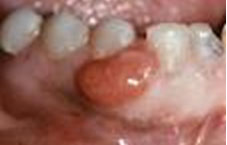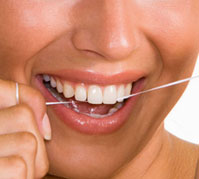Introduction
A healthy mouth is essential for a healthy pregnancy. However, diet and hormonal changes that occur during pregnancy may increase a woman’s risk for tooth decay and gum disease .The presence of disease and infections can affect the health of both the mother and her baby.

How does pregnancy affect my oral health?
- Hormonal changes during pregnancy can lead to an increased risk for gingivitis, an infection in your gums caused by plaque (germs).
- Morning sickness and vomiting during pregnancy creates an acidic environment in the mouth which can weaken the tooth enamel.
- Retching associated with morning sickness may make it difficult to brush and floss your teeth.
- Craving for sugary or starchy foods during pregnancy further increases risks for tooth decay.
What are epulis ?
 |
 |
These are localized growths or swellings that develop around the teeth and gums in response to irritants such as excessive plaque and aggravated by hormonal changes during pregnancy. They bleed easily and are characterized by a red, raw-looking mulberry-like surface. They often need to be surgically removed.
Should I avoid dental x-ray during pregnancy?
Dental radiographs should be avoided during pregnancy. However, certain dental infections and emergencies can pose a risk to the mother and foetus if left untreated. When dental x-ray is necessary, a lead apron is to be worn to protect the abdomen.
Can my poor oral health affect my baby?
The presence of poor health including dental infections can increase your risks for preeclampsia (high blood pressure during pregnancy) which leads to premature and low birth weight babies.
After your baby is born, germs that cause tooth decay can easily pass from your mouth to your baby’s mouth when sharing utensils during feeding, kissing or putting your baby’s pacifier or hands in your mouth.
What should I do to keep my mouth healthy during pregnancy?
- Visit a dentist at least once during your early pregnancy
- A dentist can tell if you have any problems in your mouth and advice you on how to keep your mouth healthy throughout your pregnancy.
- Dental work is safe at any time during your pregnancy, but it may be more comfortable during your second trimester.


- Take care of your mouth.
- Brush your teeth, especially along the gum line at least two times everyday.
- Use a small, soft toothbrush.
- Use adult strength fluoridated toothpaste.
- Floss at least once daily to clean between teeth and under your gums.
- Choose healthy diet
- Limit sugary and starchy foods to mealtimes only.
- Choose fruit rather than fruit juice.
- Avoid carbonated drinks
- Ensure adequate calcium intake
- If you have nausea and vomiting (morning sickness)
- Eat small amounts of healthy foods throughout the day
- Use a fluoride mouth rinse daily to protect your teeth from acid attack
- Rinse your mouth with water or a combination of baking soda and water after vomiting to stop the acid attack on your teeth.
| Last reviewed | : | 23 August 2019 |
| Writer | : | Dr. Lydia Mason a/k Lionel |
| Accreditor | : | Dr. Savithri a/p Vengadasalam |
| Reviewer | : | Dr. Sharol Lail bin Sujak |







